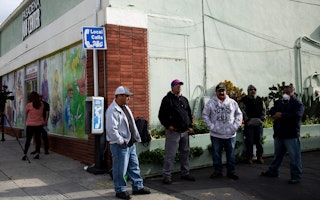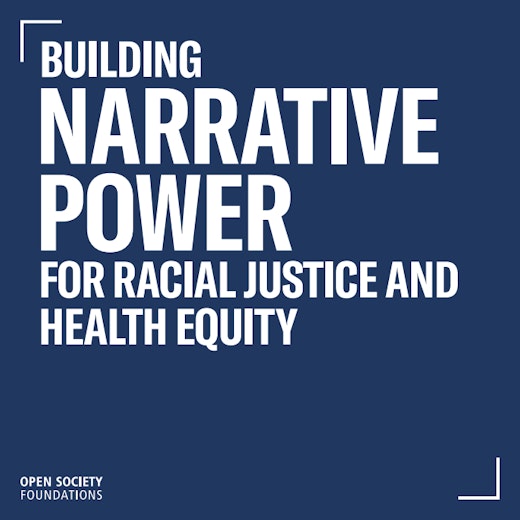Our Pandemic Response Must Center Racial Justice
By Bisola Falola & Brett Davidson

In November, during one of his daily press briefings, New York Governor Andrew Cuomo, after praising some local leaders for enforcing social distancing restrictions, assigned blame for the rising number of COVID-19 cases elsewhere in the state. “If you socially distanced and you wore a mask and you were smart,” the governor said, “none of this would be a problem.” He continued: “If you didn’t eat the cheesecake, you wouldn't have a weight problem.”
Cuomo was widely—and rightly—criticized for fat shaming, but it is also highly concerning that the governor decided to blame individual behavior for the severity of the coronavirus pandemic, rather than focusing on the role played by more important social and structural factors. The truth is that the COVID-19 pandemic, which in the United States has disproportionately harmed communities of color, has revealed a fundamental injustice within U.S. society. And blaming individual behavior for these outcomes simply compounds that injustice further.
Indeed, as recent papers in The Lancet [PDF] and the New England Journal of Medicine have pointed out, blaming individuals or communities for their experience of the pandemic—or looking for individualized solutions to the problem—is a mistake at best, and victim-blaming at worst. It is exceedingly unlikely that biological and cultural influences can explain the virus’s impact. Rather, we must look at systemic racism as a cause.
For example, marginalized and minority groups often work low-wage but essential ‘‘frontline” jobs—as grocery store clerks, home health aides, and public transit workers. As research shows, they are also more likely to commute on public transportation, have inadequate access to health care, and live in neighborhoods with higher levels of air pollution and crowding because of expensive rents. For many of these people, it simply is not possible for them to physically distance, no matter how much they strive to comply with the recommendations.
Should Governor Cuomo seek to understand any of this, he need only turn to the work of a number of Open Society grantees, which have been working to bring attention to racism as a public health crisis and to push for transformation within the fields of medicine and public health.
For example, the Narrative Power Network is continuing to challenge the cultural assumptions and dominant narratives that blame people for their own health problems and expand the public’s consciousness and awareness of the root causes of ill health. Regardless of behavior, one cannot “responsible” their way out of a toxic environment. Led by a health and racial justice coalition, including the New York City Department of Health and Mental Hygiene, the National Association of City and County Health Officials, Color of Change, Race Forward, Narrative Initiative, and ReFrame, this network aims to make equity visible.
This narrative of blaming and shaming people for health problems—especially Black communities—is killing us. As COVID-19 deaths surpass 270,000 people in the United States and 1.34M globally, we must shift our perspective toward racially just and equitable approaches. Here’s what just some Open Society grantees are doing to accomplish that end:
- The Berkeley Center for Social Medicine has published several clinical case studies analyzing and tracing the root causes of health inequity—structural racism, class oppression, exploitative labor conditions—that drive patients’ illnesses. These case studies are being used to help doctors and medical students learn how to understand and deal with these structural factors when they encounter patients in clinical settings.
- EqualHealth, through their Campaign Against Racism, is working with health workers, organizers, activists, and communities to create public policies that center racial justice and health equity within efforts to improve health. Their work includes divestment from the prison industrial complex, community alternatives to policing, prioritized COVID-19 treatment and care for communities of color, and provision of housing security and work to address housing injustice.
- Nurses United UK captured data of health care workers who died of COVID-19, by race and ethnicity, in order to tell an accurate story of who was most at risk, and advocate for resources to be effectively and equitably deployed.
- Through videos, media campaigns, and emergency relief efforts, NDN Collective, Illuminative, and the Return to Heart Foundation helped counter the invisibility and exclusion of Native communities from COVID-19 relief measures, showing how racial justice approaches not only save lives but establish pathways toward health equity.
- The organization Uplift, meanwhile, showed that we can still write the story of how the COVID-19 pandemic ends. By acknowledging the racial and economic underpinnings of the pandemic, we can make visible those who are forced into vulnerable and unhealthy situations, and hold accountable the few that can make better choices for all of us: elected officials who can enact equitable health and social policies and secure our collective wellbeing.
Recently, soon-to-be Vice President Kamala Harris proposed a COVID-19 Racial and Ethnic Disparities Task Force, which will “provide recommendations and oversight on disparities in the public health and economic response.” Once the COVID-19 crisis is over, it will become a permanent Infectious Disease Racial Disparities Task Force. Hopefully this task force, by centering racial justice, will avoid blaming individuals, as Governor Cuomo has, and will enact the structural and systemic health solutions that we all need.
Until August 2022, Bisola Falola was deputy director of Culture and Art at the Open Society Foundations.

Until November 2021, Brett Davidson was director of the Media and Narratives Division of the Open Society Public Health Program.


